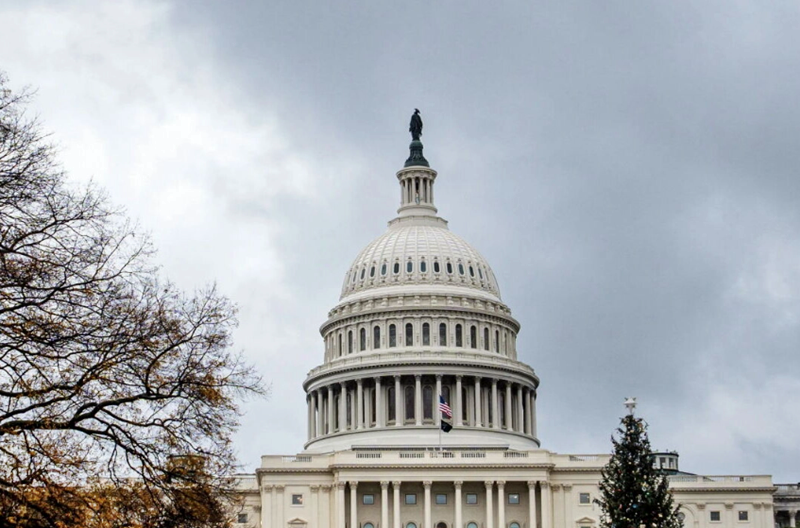Congress Scrambles for Plan B After Collapse of Funding Deal as Shutdown Deadline Nears

By Epoch - Jackson Richman- 12/19/2024
WASHINGTON—With government funding set to expire at midnight (ET) on Dec. 20, Congress is scrambling to avert a shutdown after President-elect Donald Trump expressed opposition to House Speaker Mike Johnson’s (R-La.) $100 billion funding extension, effectively dooming the bill’s prospects.
The continuing resolution (CR), put forth after extensive negotiations between Johnson and the members of the Democratic Party, included $100 billion in disaster relief, a one-year extension of the farm bill, environmental measures, veterans’ provisions, and other legislation. President-elect Donald Trump came out in opposition to the short-term funding deal and issued new demands.
“Republicans must GET SMART and TOUGH. If Democrats threaten to shut down the government unless we give them everything they want, then CALL THEIR BLUFF. It is [Senate Majority Leader Chuck] Schumer and Biden who are holding up aid to our farmers and disaster relief,” Trump wrote in a Dec. 19 post on Truth Social.Story continues below advertisement
Trump suggested that lawmakers pursue a deal to raise the debt ceiling that would otherwise be left for the early months of his administration.
The debt ceiling, which represents the borrowing limit of the United States, is expected to be reached early next year. A 2023 agreement between former House Speaker Kevin McCarthy (R-Calif.) and President Joe Biden suspended the debt ceiling until Jan. 2, 2025. However, this date does not necessarily mark when the debt limit will be reached, as the Treasury Department can employ measures to extend the deadline.
The 2023 agreement strengthened work requirements for the Supplemental Nutrition Assistance Program in addition to cutting IRS funding, discretionary spending, and unspent COVID-19 dollars.
“Increasing the debt ceiling is not great but we’d rather do it on Biden’s watch,” Trump and Vice President-elect JD Vance wrote in a Dec. 18 joint statement posted to Truth Social. “Republicans want to support our farmers, pay for disaster relief, and set our country up for success in 2025. The only way to do that is with a temporary funding bill WITHOUT DEMOCRAT GIVEAWAYS combined with an increase in the debt ceiling. Anything else is a betrayal of our country.”
The next steps to avoid a shutdown remain unclear, particularly after House Minority Leader Hakeem Jeffries (D-N.Y.) rejected any action on the debt ceiling.
“Hard pass,” Jeffries wrote in a Dec. 19 post on the social media platform Bluesky.
Jeffries criticized Trump for inserting himself into the spending fight. He said that House Republicans walked away from a bipartisan agreement.
“House Republicans have been ordered to shut down the government and hurt everyday Americans all across this country,” he told reporters. “House Republicans will now own any harm that is visited upon the American people that results from a government shutdown or worse. An agreement is an agreement.”
The White House also came out against House Republicans who opposed the CR.
“Triggering a damaging government shutdown would hurt families who are gathering to meet with their loved ones and endanger the basic services Americans from veterans to Social Security recipients rely on,” White House press secretary Karine Jean-Pierre said in a Dec. 18 statement. “A deal is a deal. Republicans should keep their word.”
With government funding in limbo, Johnson has the option to propose a measure to either fund the government at current levels until early next year or pass a CR alongside an increase in the debt limit. Alternatively, a potential government shutdown could continue until Trump takes office.
Jeffries has said that House Democrats will oppose a clean CR.
Any bill passed by the House would also need to be approved by the Senate before reaching Biden’s desk for his signature.
The Senate would have to tee up two procedural votes, one to end cloture and another to move on to a final vote, before voting on the bill itself. The vote to end cloture requires 60 votes in order to end or avoid a filibuster.
The upper congressional chamber can bypass the regular process through a time agreement, which involves votes on amendments—typically unsuccessful—in order to expeditiously reach a final vote.
Another way to expedite the process would be through what is called unanimous consent, where no senator objects to the bill. This won’t happen as GOP senators have already opposed the CR.

Epoch - Jackson Richman
